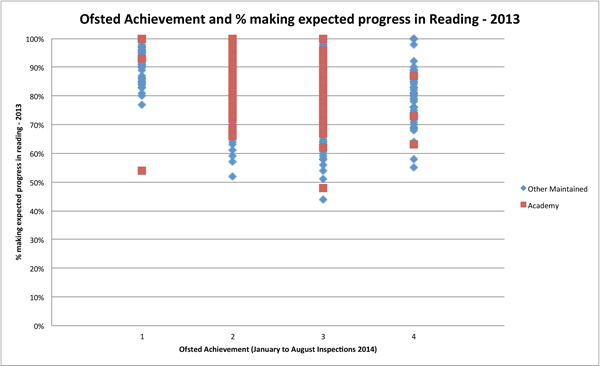– Data challenges Tory pledge to ‘takeover’ mediocre schools
– Overlap in pupils’ performance between Ofsted grades
The prime minister’s assertion that schools labelled as “requiring improvement” by Ofsted are “mediocre” and “coasting” is not backed by the government’s own data, Schools Week can reveal.
In a major education speech on Monday, David Cameron said the party would “wage a war on mediocrity” by targeting schools with the second lowest Ofsted rating.
He said that any school told it required improvement would have to become a sponsored academy if it could not prove it had the capacity to turn itself around.
But analysis by Schools Week suggests there is a large overlap in the academic outcomes of primary pupils at schools rated good by Ofsted and those judged to require improvement.
The measured progress of pupils in reading at primary level also shows little difference between schools with the two Ofsted grades (pictured below).
The data shows more discrimination when it comes to GCSE grades but there is still an overlap with many schools requiring improvement equalling or bettering the achievement of schools rated as good.
On each graph, the red dots denote academies; blue dots are maintained schools.
The top graph shows that primary academies requiring improvement typically have lower achievement than their maintained school counterparts.
When looking again at the progress graph however, the picture is reversed, with academies typically scoring most highly within all grades.
Association of Teachers and Lecturers’ general secretary Mary Bousted said Mr Cameron’s plan would lower standards.
“The graphs show there is a huge overlap, in terms of pupil achievement, between schools rated good by Ofsted and those deemed to require improvement.
“It is also clearly the case that community schools achieve better than sponsored academies in all Ofsted categories.
“It appears, then, that David Cameron’s drive to academise all schools that require improvement will have the effect of lowering standards in those schools.”
However, Russell Hobby, general secretarys of the National Association of Head Teachers, said it was important to remember that recently sponsored schools would be at the “start of their journey” and needed to be given space to improve.
Schools Week used publicly available data from Ofsted and the Department for Education (DfE) for the analysis. The data used 2013 results, as this would have been available to Ofsted for inspections last year – which are the inspections included in the graphs.
Mr Hobby said: “One of the surprising things about Mr Cameron’s announcement was the blatant focus on academisation when three fairly significant reports show the data is actually much more ambiguous – those by the National Audit Office, public accounts committee and education select committee.
“They are not a condemnation of academies but it does mean the government’s default is not really justified by evidence.”
In his speech Mr Cameron said: “Under a Conservative government, any school that Ofsted says ‘requires improvement’ and cannot demonstrate that it has the capacity to improve will have to become a sponsored academy.”
Ofsted inspects a variety of areas, with achievement data only one factor in judgments.
However, Ms Bousted added: “Given that school leaders complain that inspection judgments are overly dependent on raw data, and given that the raw data shows huge parallels between the performance of pupils in good and requires improvement schools, on what basis is Ofsted making its inspection judgments?”
Emma Knights, chief executive of the National Governors Association, agreed with Ms Bousted. “This data confirms that ‘requiring improvement’ schools range from those which are very nearly good, and perhaps might have been judged as ‘good’ by a different Ofsted team on a different day, to those which have narrowly missed an inadequate.
“They will not all require the same actions to improve, but presumably this will be taken into account when decisions are made on the future structures of schools. There might well be actions which are more important than changing the legal status of a school; indeed sometimes that change process can be a diversion from improving teaching and learning.”
But she added: “The prime minister is right to identify that good school leadership is an extremely important component in improving a school.”
She said she was concerned governing bodies did not always receive quality applicants for senior posts. “Altering the
legal status of a school does not of itself improve the school leadership, but being part of a formal group of local schools with joint accountability – whether a multi-academy trust or a local authority maintained federation – does tend to improve the
standards of teaching and learning within those schools.”
Ofsted was unable to comment due to the political nature of the commitment.








Another consideration is that Ofsted may be more generous in its grading of academies than of community schools. So perhaps the red schools low down in grades 2 and 3 really belong in grades 3 and 4, and some of the blues should be moved up a grade or two.
This emphasises the perception that for many schools there are only 4 words that ‘count’: good, outstanding, English and mathematics. Everything else is just that, everything else. Leadership should be brought into spotlight if it focusses too much on the type of linguistics that reflect a national rhetoric on what is deemed to make a school successful. Good leadership inspires teachers to get out of bed in the morning and centres on development not measurement. It works with people first rather than replacing personal and professional development with the theories and paradigms to be discovered in national leadership programmes.